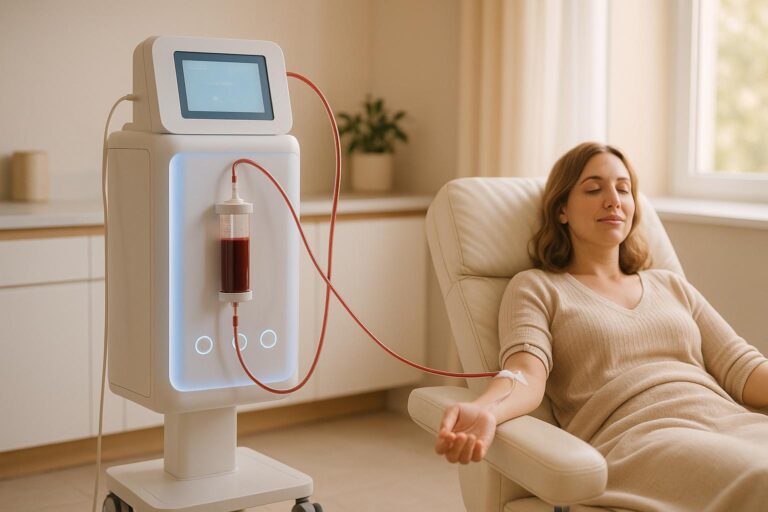Hormonal imbalances can impact your energy, mood, sleep, and overall health. If you’re experiencing persistent symptoms, it might be time to consider hormone replacement therapy (HRT). Here are 7 key signs to watch for:
- Constant Fatigue: Feeling tired even after a full night’s sleep.
- Mood Swings: Unexplained anxiety, depression, or irritability.
- Weight Changes: Sudden weight gain or difficulty losing weight.
- Low Sex Drive: Decreased libido or discomfort during intimacy.
- Sleep Problems: Trouble falling or staying asleep, night sweats.
- Hot Flashes: Intense heat waves, common during menopause.
- Brain Fog: Memory issues or difficulty concentrating.
HRT can help restore balance, reduce symptoms by up to 85%, and improve quality of life. If these signs sound familiar, consult a healthcare provider for hormone testing and personalized treatment options.
3 Warning Signs You Need Hormone Replacement Therapy Over 40
How Hormonal Imbalances Affect Your Health
Your body relies on over 50 different hormones to keep everything running smoothly, from your energy levels to your sleep patterns. When just one of these hormones falls out of balance, it can set off a chain reaction of health issues.
"I think in many respects, hormones control everything." – Dr. Katz, Weill Cornell Medicine Physician
These chemical messengers work together to maintain your health, making their balance essential for your overall well-being.
What Hormones Do in Your Body
Hormones act as your body’s communication network, sending signals to organs and tissues to regulate key functions. Hormones like estrogen, testosterone, insulin, cortisol, serotonin, adrenaline, and thyroid hormones each play specific roles that influence your daily life.
"Hormones are chemicals produced within and sent throughout your body to help regulate and control your body’s development. They play a large part in many of our daily functions as well as critical life milestones." – Weill Cornell Medicine
Take thyroid hormones and insulin, for example. These regulate your metabolism – low thyroid hormone levels can slow it down, while insulin resistance can lead to fat storage and elevated blood sugar.
When it comes to mood regulation, hormones like estrogen and cortisol are key players. Estrogen fluctuations during the menstrual cycle can cause mood swings, while lower estrogen levels are linked to insomnia and depression. Chronic stress, which raises cortisol levels, can also take a toll on emotional health.
Your sleep-wake cycle depends on hormones like melatonin and cortisol. If these hormones fall out of sync, you might struggle with sleepless nights or daytime fatigue.
Sexual function and reproduction are also hormone-driven. Estrogen, progesterone, and testosterone are crucial for libido, fertility, and overall sexual health. Imbalances in these hormones can affect intimate relationships and quality of life.
Understanding how these hormones function underscores how easily disruptions can ripple through your body.
What Causes Hormonal Imbalances
A variety of factors can upset your hormone levels, and understanding these triggers helps explain why hormonal imbalances are becoming more common.
Aging is a major factor. As you age, your body naturally produces fewer hormones. Women experience significant shifts during menopause, while men face a gradual decline in testosterone levels.
Chronic stress is another culprit. Prolonged stress raises cortisol levels, which can disrupt other hormones. High cortisol can interfere with thyroid function, sex hormone production, and insulin sensitivity. This often leads to symptoms like fatigue, weight gain, and mood swings.
Lifestyle choices also play a big part. Poor diet, lack of exercise, insufficient sleep, and heavy alcohol consumption can throw off hormone production and regulation.
Medical conditions can directly impact hormone levels as well. For instance, polycystic ovary syndrome (PCOS) causes higher androgen levels and insulin resistance in women, often leading to acne and weight gain. Conditions like thyroid disorders and diabetes also affect hormone production.
The effects of these imbalances go beyond isolated symptoms. Studies reveal that 47.8% of reproductive-age women worldwide experience premenstrual syndrome (PMS), with about 20% suffering symptoms severe enough to disrupt daily life. Women with functional hypothalamic amenorrhea also report higher levels of depression, anxiety, and difficulty managing stress.
These warning signs often signal the need for targeted interventions to restore hormone balance. Identifying the causes behind these disruptions is the first step toward better hormone health.
7 Signs You May Need Hormone Replacement Therapy
Hormonal imbalances often sneak up on you, showing up as subtle changes that can be easy to overlook. But certain patterns might indicate that your hormones are out of sync and could benefit from professional attention. Here are seven signs that it might be time to check your hormone levels.
1. Constant Fatigue and Low Energy
Feeling exhausted all the time, even after a full night’s sleep? That could be a sign your hormones are out of balance.
Fatigue is one of the most common red flags when it comes to hormonal issues. For instance, low thyroid hormone levels can slow your metabolism, leaving you feeling sluggish. Similarly, reduced levels of estrogen and testosterone may sap your energy, making even everyday tasks feel like monumental efforts.
2. Mood Swings and Emotional Changes
If you’re experiencing sudden mood swings, irritability, or unexplained bouts of anxiety or depression, your hormones might be to blame.
Fluctuations in estrogen and progesterone can disrupt the neurotransmitters in your brain that help regulate mood. On top of that, chronic stress can lead to cortisol imbalances, which only add to emotional instability.
3. Unexplained Weight Changes
Struggling with unexpected weight gain or finding it nearly impossible to shed pounds despite sticking to your usual diet and exercise routine? Hormones might be at the root of the problem.
Thyroid imbalances can slow your metabolism, while changes in estrogen or testosterone levels can shift how your body stores fat, leading to weight gain.
"Unexplained weight loss is a red flag… It’s not typical to have a noticeable drop in weight without changing how much you’re eating, being more physically active or trying to lose weight."
– Christine Goukasian, RDN, MS, senior dietitian with the UCLA Division of Clinical Nutrition
If you lose more than 5% of your body weight over 6 to 12 months without making any lifestyle changes, it’s important to consult your doctor.
4. Low Sex Drive and Sexual Problems
A noticeable drop in libido or issues like discomfort during intimacy or erectile challenges could point to declining levels of sex hormones.
This is particularly common in women going through perimenopause or menopause, as estrogen and testosterone levels naturally decrease. Fatigue and sleep disruptions caused by hormonal imbalances can also take a toll on sexual interest and performance. If these changes persist, it’s worth discussing with your doctor.
5. Sleep Problems
Trouble falling or staying asleep might be linked to hormonal imbalances involving melatonin and cortisol. High cortisol levels in the evening can keep you wired when you should be winding down, while low melatonin can make it tough to drift off.
On top of that, declining estrogen levels can lead to night sweats or hot flashes that disrupt your rest, and reduced progesterone might make it harder to relax. If sleep issues interfere with your daily life for more than four weeks, it’s time to seek help.
6. Hot Flashes and Night Sweats
Those sudden, intense heat waves that leave you sweating and your heart racing are classic signs of hormonal shifts, especially during menopause.
Hot flashes affect up to 80% of women during menopause. They can range from mild warmth to severe episodes that disrupt daily activities or soak through your bedding at night.
7. Memory Problems and Brain Fog
Struggling to concentrate, feeling forgetful, or dealing with brain fog? These could all be signs of a hormonal imbalance that’s impacting your cognitive function.
Estrogen plays a big role in mental clarity, so when levels drop during perimenopause or menopause, memory and focus can take a hit. Thyroid and cortisol imbalances can also make it harder to think clearly or process information.
If these cognitive challenges are making it hard to get through your day, talk to your doctor for a thorough evaluation.
If several of these signs sound familiar, it might be time to consider a hormone evaluation to see if replacement therapy could help you feel like yourself again.
sbb-itb-d9e542d
When to Get Professional Help
If you’re dealing with persistent fatigue, mood swings, unexplained weight changes, or a rapid heartbeat that disrupts your daily routine and doesn’t respond to typical remedies, it might be time to consult a professional. These symptoms could be your body’s way of signaling hormonal imbalances that need further investigation through precise testing.
Why Hormone Testing Matters
Hormone testing plays a crucial role in identifying specific imbalances, guiding tailored treatments, and ruling out other conditions. Common testing methods include:
- Blood tests: Assess levels of testosterone, estrogen, cortisol, and thyroid hormones.
- Saliva tests: Measure estradiol, progesterone, and testosterone levels.
- Urine tests: Provide insights into how your body metabolizes and eliminates hormones.
Keeping a symptom diary can make your consultation more effective, helping to highlight patterns or triggers. Regular monitoring ensures treatments are working and allows for timely adjustments.
Once you’ve recognized the importance of accurate testing, finding the right provider becomes the next step.
Why Choose Kinnection Clinic for Hormone Health

Kinnection Clinic takes a personalized, science-driven approach to hormone replacement therapy. Their process starts with thorough hormone testing to uncover imbalances in estrogen, progesterone, testosterone, thyroid, and adrenal levels. As they explain:
"HRT at Kinnection Clinic is about more than just balancing numbers on a lab test – it’s about restoring energy, improving vitality, and helping you feel your best every day."
Their care goes beyond simply replacing hormones. They combine customized bioidentical hormone therapy with nutritional and lifestyle guidance, addressing the underlying causes of hormonal issues for long-term health improvements.
Patients rave about their experiences at Kinnection Clinic. Shannon S. shared:
"I absolutely love this place! Everyone’s kind, knowledgeable, and delivers personalized, whole-body care."
Similarly, Robert B. expressed:
"Kinnection Clinic truly fixes the root cause, not just symptoms, with personalized care that delivers real, lasting relief."
Ready to take control of your hormone health? Book a Functional Medicine Consultation to start your evaluation. Be sure to share all your symptoms during the consultation to ensure the right tests are conducted.
Hormone Replacement Therapy at Kinnection Clinic
At Kinnection Clinic, the focus is on improving hormone health through Bioidentical Hormone Replacement Therapy (BHRT) – a natural alternative to synthetic hormone treatments. This approach not only replaces missing hormones but also tackles the root causes of imbalances, helping the body restore itself naturally. By using plant-based, bioidentical hormones, patients often experience fewer side effects while enjoying improved energy and vitality. This method lays the foundation for a treatment plan tailored to each individual’s needs.
Custom Treatment Plans for Better Results
Every patient at Kinnection Clinic benefits from a personalized treatment plan. The process starts with thorough hormone testing, assessing critical markers like estrogen, progesterone, testosterone, thyroid, and adrenal functions to identify specific imbalances. From there, the clinic combines hormone replacement therapy with additional strategies like nutrition guidance, stress management, and lifestyle adjustments. This comprehensive approach promotes long-term health improvements.
The wellness team also provides exercise recommendations and custom nutrition plans, ensuring patients receive well-rounded care. Regular follow-ups and monitoring allow for adjustments to the treatment as needed, keeping progress on track.
To further support overall health, Kinnection Clinic offers additional therapies, such as IV treatments and regenerative medicine, which complement the benefits of bioidentical hormones and enhance long-term vitality.
Benefits of Bioidentical Hormones
Bioidentical hormones are designed to closely mimic the body’s natural hormones, making them easier for the body to process and reducing the likelihood of side effects. Because these hormones are plant-derived and chemically identical to those produced by the human body, they integrate seamlessly into the body’s natural hormone pathways. This often results in more stable hormone levels, which can lead to consistent energy, improved mood, and better sleep.
Many patients report enhanced mental clarity, easier weight management, and an overall boost in vitality. When paired with Kinnection Clinic’s comprehensive care – which includes addressing diet, stress, and lifestyle factors – bioidentical hormone therapy becomes part of a broader strategy for achieving lasting health and wellness.
This integrated approach ensures that hormone replacement therapy is not just a treatment but a step toward a healthier, more balanced life.
Conclusion: Take Control of Your Hormone Health
Understanding the symptoms and testing options discussed earlier is just the beginning. If you’re experiencing constant fatigue, mood swings, unexplained weight changes, low sex drive, sleep disturbances, hot flashes or night sweats, and memory issues, it may be time to consult a healthcare professional. These signs can often point to hormonal imbalances that shouldn’t be ignored.
When left untreated, hormonal imbalances can lead to more serious issues like chronic fatigue, depression, weight gain, heart problems, and weakened bones. Acting early with a professional evaluation and a tailored treatment plan can help you avoid these complications and improve your overall well-being.
Tracking your symptoms and seeking guidance promptly is key. Experts emphasize the importance of monitoring changes in your body and consulting with medical professionals to address hormonal issues before they escalate. Proper hormone management can restore energy, stabilize your mood, enhance sleep quality, and improve your daily life.
At Kinnection Clinic, the path to hormone balance starts with thorough testing and individualized care. Their approach includes Bioidentical Hormone Replacement Therapy, combined with nutritional advice, stress management techniques, and lifestyle adjustments. This comprehensive strategy offers a strong foundation for improving your health. Plus, regular support and monitoring ensure you stay on track.
Ready to take control of your hormone health? Schedule a consultation today to explore personalized treatment options and reclaim your balance.
FAQs
What are the risks and side effects of hormone replacement therapy (HRT)?
Hormone replacement therapy (HRT) comes with potential risks and side effects that can differ depending on your health, the type of therapy used, and how long it’s administered. Some of the more serious risks include a slightly higher chance of developing heart disease, stroke, blood clots, breast cancer, or gallbladder disease. For individuals with certain medical histories – like previous strokes, liver disease, or specific cancers – HRT may not be a suitable option.
On the less severe side, common side effects might include bloating, breast tenderness, headaches, nausea, and irregular bleeding or spotting. These effects are usually mild, but it’s still important to talk to your healthcare provider. They can help you decide if HRT is the right choice and address any concerns you might have.
For most people, when HRT is tailored to their needs and carefully monitored, the risks tend to remain low. Always prioritize open communication with your doctor to ensure the safest approach.
How can I tell if hormone replacement therapy is right for me?
Recognizing whether hormone replacement therapy (HRT) might be a good option for you often begins with identifying symptoms. Persistent fatigue, mood swings, hot flashes, night sweats, or a noticeable decrease in libido could point to hormonal imbalances that HRT may help address.
The next step is consulting a healthcare professional. They’ll assess factors like your age, medical history, family health risks, and the severity of your symptoms. This evaluation helps determine if HRT is a safe and suitable choice for improving your quality of life. With personalized advice, you can ensure any treatment plan aligns with your health needs and lifestyle.
What are some lifestyle changes that can enhance the benefits of hormone replacement therapy?
To get the most out of hormone replacement therapy (HRT) and support your hormone health, certain lifestyle choices can make a noticeable impact. Start with a balanced diet – include lean proteins, healthy fats, whole grains, leafy greens, and soy-based foods. These nutrient-rich options can help provide the building blocks your body needs.
Regular exercise is another essential piece of the puzzle. A mix of strength training and aerobic activities can promote better overall health while helping to maintain hormonal balance.
Don’t overlook the importance of stress management. Practices like mindfulness or yoga can help keep stress levels in check. Aim for 7–9 hours of quality sleep each night to give your body the rest it needs, and focus on maintaining a healthy weight, as this can influence hormone levels. Together, these habits can naturally regulate hormones and amplify the benefits of HRT, leaving you feeling more energized, balanced, and well.



